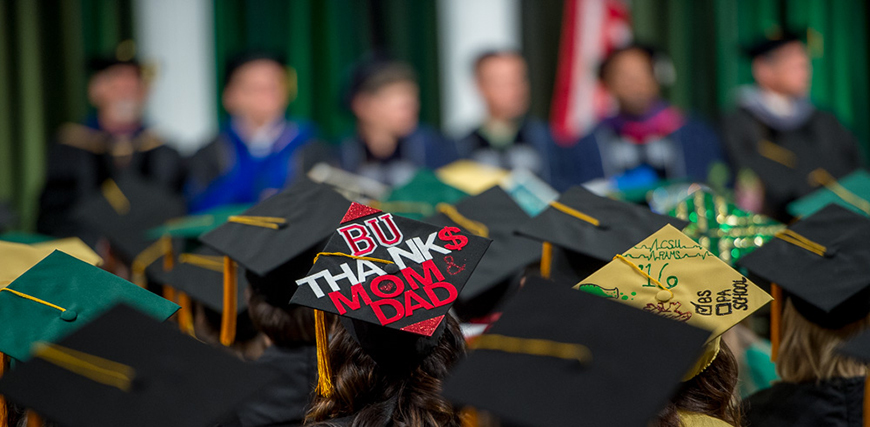
CSU commencement is May 12-14. We’re celebrating by sharing just a few snapshots of undergraduates and their achievements in the College of Veterinary Medicine and Biomedical Sciences. Congratulations to all our graduates!
Taryn Arcarese, Biomedical Sciences
By Rhea Maze
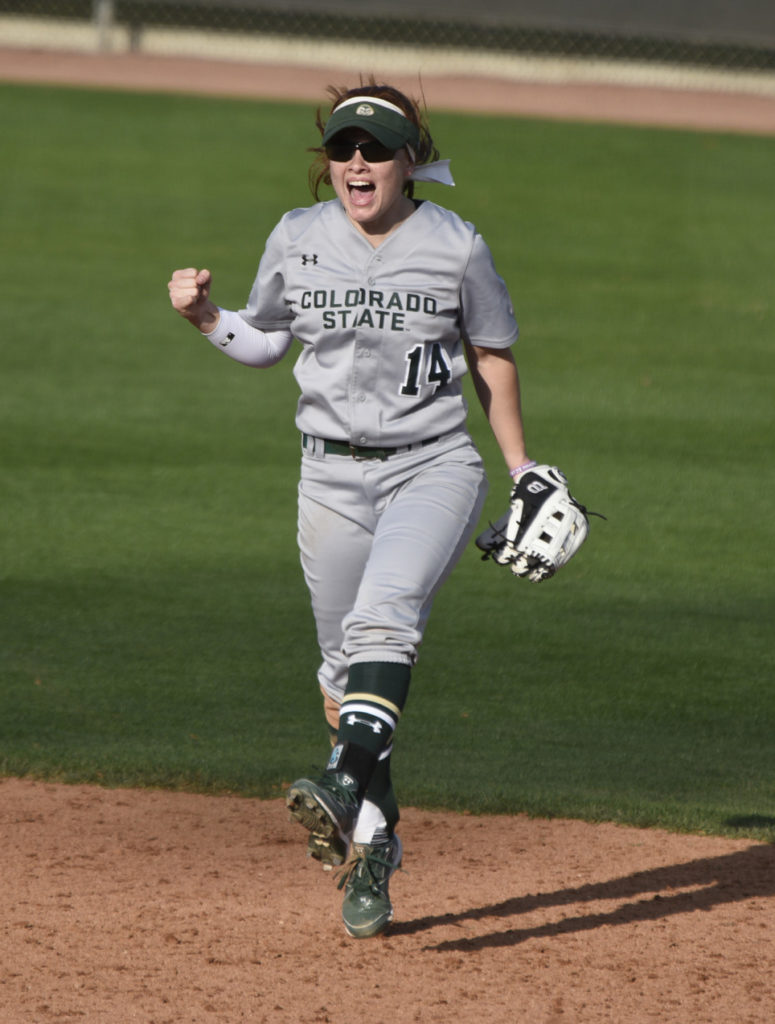
Saturday, May 13, is a big day for Taryn Arcarese. At 8 a.m., she’ll take the stage and receive a diploma in biomedical sciences from Colorado State University. At noon, she’ll take her position at second base and play the last game of her competitive NCAA Division I softball career.
“There are going to be a lot of emotions,” said Arcarese, a student athlete with one of the toughest majors on campus.
For Arcarese, being able to turn a double play and ace an anatomy exam all in a day’s work took persistence, passion, and a lot of dry-erase markers.
“Taryn has an energetic attitude, is extremely hardworking, and figured out how to balance rigorous coursework with grueling workouts and game-day activities,” said Charles Miller, a professor in the Department of Biomedical Sciences, associate department head, and director of its undergraduate program. “She’s smart, tough, and never whines.”
CSU’s softball team trains six days a week year-round and travels most weekends during the season. While on the road with her team, Arcarese could often be found writing out study notes from her classes on bus and airport windows. “People gave me funny looks but I didn’t care,” Arcarese said. “I love science and really enjoyed going through this program.”
The oldest of five siblings, Arcarese grew up in Monument, Colorado, and planned to attend community college before she was offered a 75-percent scholarship by CSU.
“Just getting to play for another four years was incredible,” Arcarese said. “The hardest part of juggling it all was getting through the long days, but I loved it. And my parents raised me really well and taught me not to quit when things get hard.”
Though she may play again recreationally, after Saturday’s game Arcarese is hanging up her cleats. With few teams and meager player salaries, professional softball never seemed like a realistic option.
“The current state of women’s professional softball is pretty disappointing,” Arcarese said. She, like her peers in Rambition, a CSU organization that connects and empowers female student-athletes and raises awareness for women’s sports, hopes to see opportunities for women in professional sports grow in the future.
Arcarese now plans to pursue graduate school and a career in medicine that will allow her to serve others in a meaningful way, continuing the experience gained when she helped her mother open a health-care clinic for low-income families in Colorado Springs.
No matter where she goes, Arcarese will always have a group of strong women to lean on. “I turn to my team for everything,” she said. “They’re my best friends.”
Edith Gonzalez, Environmental Health
By Kristen Browning-Blas
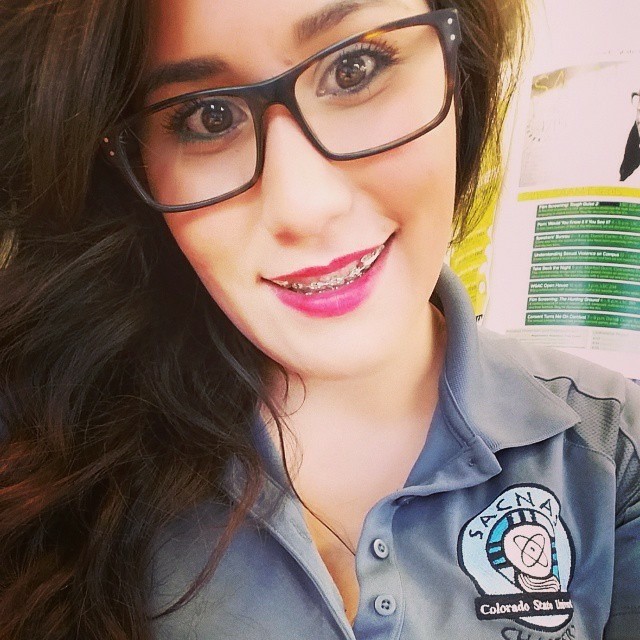
Edith Gonzalez has a message for young Latinas, or anyone, who is struggling with school: “Just do it. There’s really nothing holding you back, you can do anything want. If you’re passionate, there’s always a way.”
She can back up that advice with hard-earned life experience. After suffering two knee injuries and the death of her grandfather during her first two years as an undeclared science major at CSU, Gonzalez’s grades in chemistry and biology dropped. She was put on academic probation and was eventually dismissed.
“It was devastating. It all happened so quickly and I thought maybe I should just change majors to something easier, but I was like no, I have to finish my degree,” said Gonzalez, who will graduate this year with a degree in Environmental Health.
She took classes at Front Range Community College and at CSU through the GUEST Program (Granting University Enrollment for a Specific Term). Once she got her GPA back up, she returned to CSU and changed her major to Environmental Health, somewhat of a family tradition for the Gonzalez family. “We’re all Rammies,” she said. Her brother graduated from the program, her mother earned a master’s degree in food safety, and her younger siblings attend CSU.
“It was hard for me to tell my parents that I wasn’t doing as well as they thought I was, because I wanted to make them proud,” she said. “But they wanted me to get my degree because they know a degree means a better future.”
That future looks bright now. Gonzalez has worked as an intern with the Weld County Health Department for nearly a year, and is applying for health inspector jobs post-graduation.
Environmental health professionals assess environmental factors in our air, water, soil, homes and workplaces, with the goal of preventing disease and creating healthy spaces. Gonzalez enjoys the variety and challenges the field offers.
“It’s different every day, you get to meet a lot of people and learn about different cultures and their way of cooking,” said Gonzalez, who brings a unique cultural perspective to her work, coming from a bilingual family that owned a restaurant, Spicy Mexican Grill in Lakewood. “I got to see how hard it is to actually train employees, being able to see both sides helps me to understand where the owners are coming from. We try to educate people so they know why we are enforcing the regulations. You just have to go in there and be straight with them and be able to explain and make sure they understand.”
While she says she has a “strong stomach” thanks to time spent with family in Mexico, Gonzalez admits her job makes it hard to go out to eat. “My friends are like, ‘we can’t take you anywhere.’ I try not to face the kitchen. I’m like ‘they’re not wearing gloves,’ you’re thinking of all the things that could be wrong.”
During her time at CSU, Gonzalez was involved in the Society for Advancement of Chicanos and Native Americans in Science, which she credits for helping her become the professional she is today. “I got a Chicana friend to major in environmental health, too. I never really felt like a minority but I know there’s not a lot of us in the sciences.”
She credits the supportive environmental health faculty for making her feel welcome. “She contributes in class – not just answers to questions, but often-times personal accounts from an experience she has had or from her internship. She is going to be a terrific food inspector,” said assistant professor and undergraduate program director Judy Heiderscheidt.
“Edith is the living example of resilience! She was challenged in so many ways through her studies in environmental health, and could have given up but did not. She succeeded due to her persistence and commitment to hard work, personal and professional success. I am so very proud of her,” said associate professor David Gilkey.
Delaney Leffel, Neuroscience
By Kristen Browning-Blas
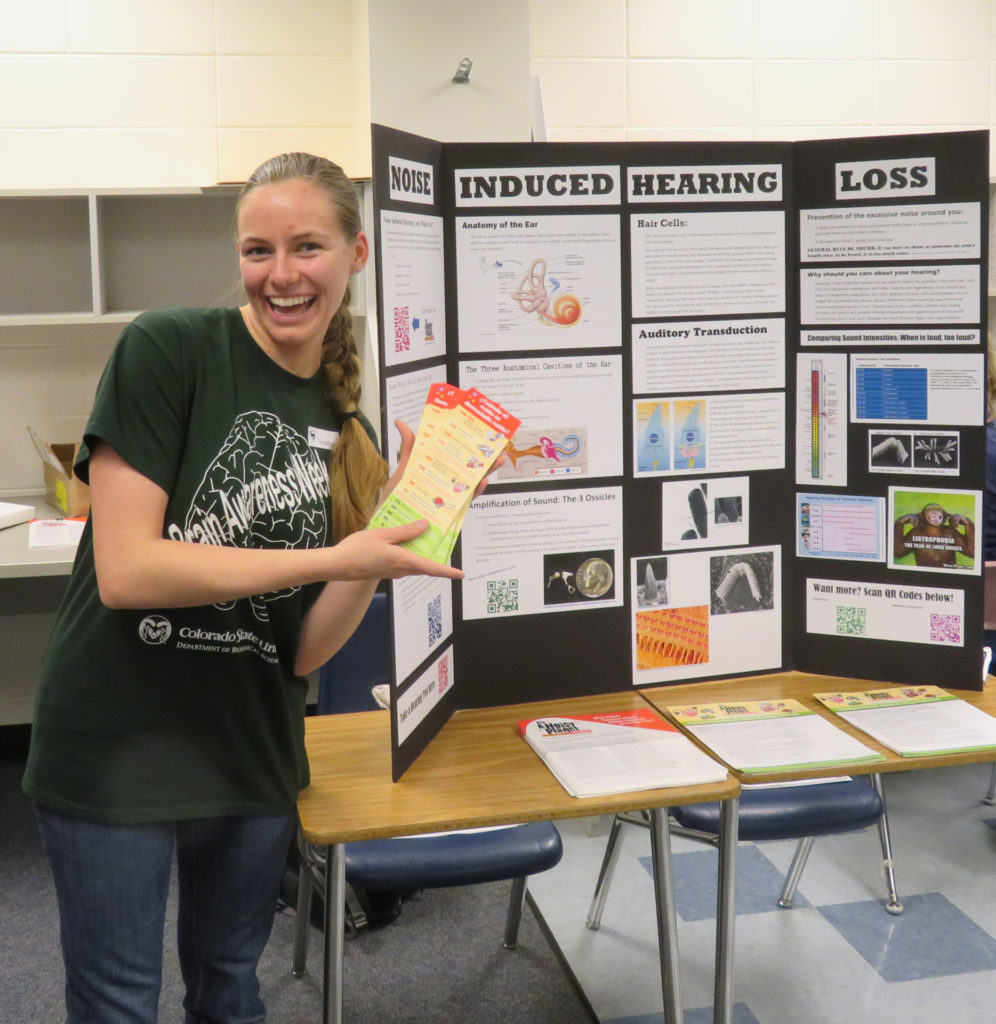
Neuroscience major Delaney Leffel’s mouth moves at the speed of thought.
“Incaseyouhaven’tnoticedItalkreallyfast,” said the 21-year-old senior who completed CSU’s undergraduate neuroscience program in three years, and will graduate on May 13.
“I’m sure it has something to do with my hyperactive basal nuclei. I have ADHD but I think it’s actually been a blessing, because I have all that energy and drive,” said Leffel, who knew from kindergarten that she wanted to be a scientist. She even dressed as a neuron for Halloween in high school in Janesville, Wisc.
At CSU, she started out in biochemistry, but when she learned about the new neuroscience major, she jumped at the chance to study her favorite subject – the brain.
“I loved cellular processes. I took an anatomy course, but that was too big for me, I had to get down to the neuron, I had to get into the cells,” she said, speeding up as she described the wonder of the nervous system.
“Your brain is like a galaxy. It looks like a galaxy, with all the stars and the solar systems, you see these dendrites coming off and they look like they could be solar flares or nebulae. In space you have gasses going around, and physics with the gravitational pulls — it’s the same thing with neurons, they’re releasing these growth factors, trying to get other neurons to come to them, reforming their synapses, so it looks like the same thing.”
She might be studying tiny neurons, but her plans are big.
Leffel will apply to the University of Colorado School of Pharmacy’s dual Ph.D. program this summer. “I like the science of pharmacology, but I want a little more patient interaction than the lab bench can give me, so I plan to specialize in psychiatric pharmacy,” she said.
Leffel has a complicated relationship with psychiatric medication, and speaks openly about her ADHD. “I don’t want to be on medication. I feel like I’m more happy without it, but in an academic setting like this, if I’m not on medication, my mind zooms ahead,” she said. “I got A’s all through my middle school and high school years, and my psychiatrist told me it’s because I fill in the gaps, but I got my first C my freshman year in college and I was like, maybe I should use medicine every now and then.”
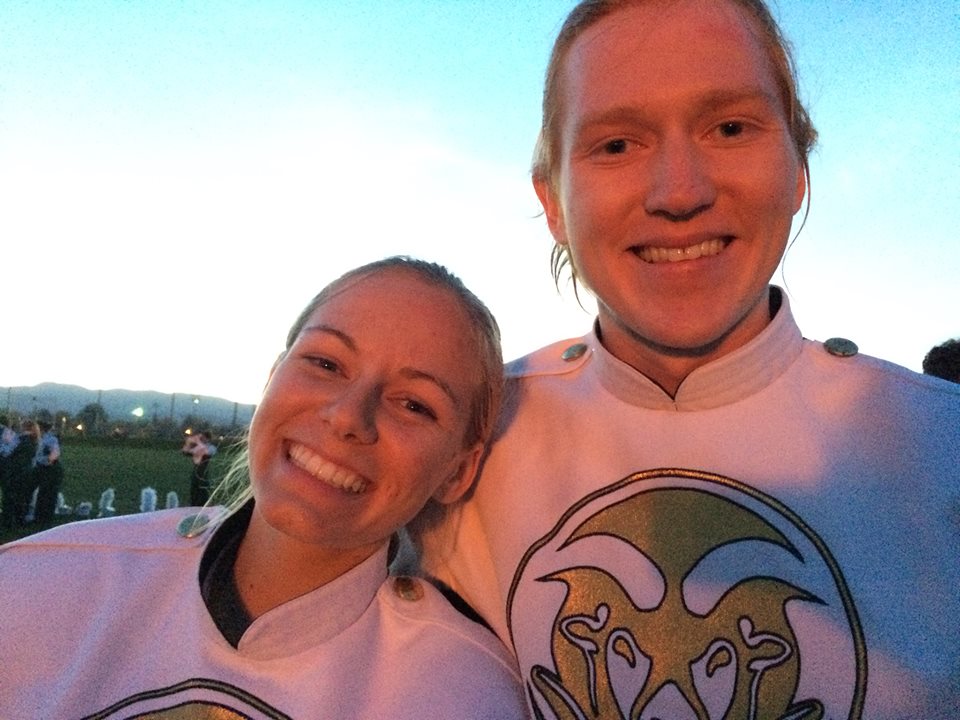
Taking medication helps her focus in demanding classes, but it doesn’t slow down her extracurricular activities, which range from the Neuroscience Student Organization, to marching band, to church activities, to leading a Girl Scout troop at Coyote Ridge Elementary.
“I don’t like to be bored. There’s just so many things that I find interesting,” she said.
The day Leffel was interviewed for this profile, she was heading to an exam in assistant professor Leslie Stone-Roy’s Systems Neurobiology class. “I don’t need medication for that class, because she’s such a good teacher,” said Leffel.
“In class, Delaney is consistently engaged, asks thoughtful questions and does well on exams and papers. Her comments elevate the conversation and she is very insightful, friendly, and helpful,” said Stone-Roy.
Assistant professor Phillip Quirk, director of the Undergraduate Neuroscience Program, calls Leffel the program’s most visible student.
“From the outset, Delaney distinguished herself as dedicated student with a passion for education and a drive to make the program something special. To students, staff and faculty, Delaney has become the face of the undergraduate neuroscience program,” Quirk said. “She will be missed.”
But she plans to stick around, taking a few more cognitive neuroscience classes at CSU while her high-school sweetheart husband completes his degree, also in neuroscience.
“There’s very little we know, that’s why we go to college, to find out what we don’t know,” she said.
Savannah Rocha, Microbiology
By Mary Guiden
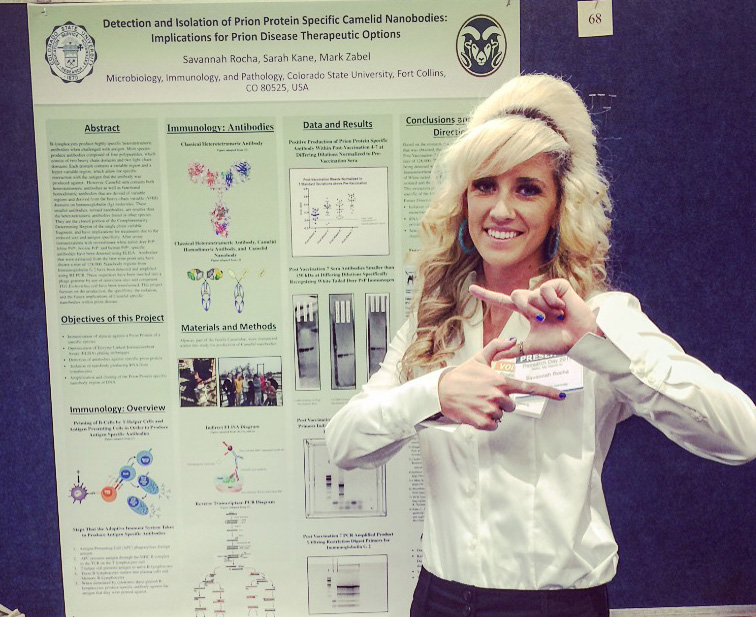
Savannah Rocha was a sophomore in high school in Crawford, Colorado, when her father was diagnosed with cancer. Doctors didn’t know if he would make it to her graduation, and she felt helpless.
At the time, she was learning about proteins and cancer in science class. She realized her calling: to figure out what’s behind diseases like cancer and to prevent other families from feeling disheartened.
Rocha is graduating with a bachelor’s degree in microbiology from Colorado State University. Her father’s cancer has been in remission for six years. She starts work on a Ph.D. at CSU next fall, and said she hopes to be a professor one day.
Life, she said, is good.
Rocha said she took a different path, compared with her high school peers; only a handful of them will graduate from college.
“My mom always instilled in me that education is huge,” she said. “‘You will always have your education,’ she told me. That drove me, as well as not wanting to feel the way I felt about my dad’s cancer diagnosis.”
Rocha jumped into research as well as education during her sophomore year at CSU. She emailed every professor in the Department of Microbiology, Immunology, and Pathology, and landed in the lab of Ramesh Akkina, where she said she “fell in love” with cell culturing.
After taking an immunology class with Associate Professor Mark Zabel, she began studying the basic mechanisms of prion diseases in his lab.
“Ever since then, it’s been my passion,” she said, describing the neurodegenerative ailments known as prion diseases, including Chronic Wasting Disease in deer, which is similar to concussion, Alzheimer’s and Parkinson’s disease in people. There are no treatments or cure for prion diseases.
Zabel described Rocha as hardworking, smart, motivated and organized. “Savannah is a serious student, an engaged citizen and a great advocate for women scientists,” he said.
Rocha has been studying the alpaca’s immune system, trying to replicate antibodies in the animals with an eye towards creating a possible treatment. She’s presented her research at Celebrate Undergraduate Research and Creativity and the Multicultural Undergraduate Research Art and Leadership Symposium. Last May, Rocha discussed her work at a conference in Japan, and was published in the journal Prion.
Rocha is the recipient of a Microbiology Scholarship and Green and Gold Scholarship from CSU. She also received the Lena Sammons Reed Scholarship and awards from the Rotary Club of the North Fork Valley and Hotchkiss Kiwanis.
Outside of the lab, Rocha is a gifted athlete who lifts weights competitively. She will take part in her first body-building competition in the fall.